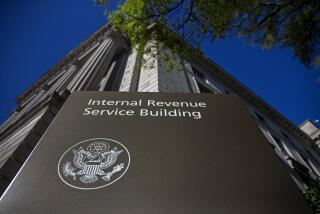What if you can’t pay your taxes?
- Share via
Today is the deadline to pay your taxes. What if you don’t have the cash?
As tempting as it would be to ignore the tax bill and hope the Internal Revenue Service won’t notice, experts say that’s the worst thing you can do.
“Eventually, they are going to catch up to you and send you notices, asking, ‘Where is your tax return?’ ” said Maureen McGetrick, a tax partner with BDO Seidman in New York.
A wiser course if you’re having trouble coming up with the money is to be proactive.
Your first step: File your federal return -- or request an extension to file -- by the tax deadline and send in as much money as you can. That way at least you’ll avoid a penalty for failing to file, which starts at 5% of the unpaid tax each month and goes as high as 25%, said Bob D. Scharin, senior tax analyst with Thomson Reuters in New York.
If you file on time but can’t pay your bill, the consequences are less severe. You’ll owe a failure-to-pay penalty that starts at only 0.5% a month, plus interest at an adjustable rate that is currently 4%.
You can obtain an automatic extension to file your return through the IRS Free File site at www.irs.gov or by submitting Form 4868. An extension gives you six more months -- until Oct. 15 -- to file your return. But you still are expected to pay the amount of taxes due by April 15. If you don’t, you’ll owe interest and possibly a penalty.
Of course, you conceivably could pay the bill by borrowing -- from friends or family, perhaps, or against your 401(k) -- but none of those options is ideal. You could pay by credit card, but there’s a service fee averaging about 2.5% of the tax bill plus the interest on the resulting card balance.
The IRS, however, offers two solutions worth looking into:
* If you owe up to $25,000 in taxes and interest, you can request to pay your bill through installments. Make the request by completing the Online Payment Agreement Application on the IRS website, by submitting Form 9465 or by calling the IRS at (800) 829-1040. Those owing more than $25,000 must file a more extensive Form 433-F, the IRS said.
Under an installment plan, you propose how much you can pay each month based on your finances. Repayment plans can span as many as five years and plan proposals are generally accepted, IRS spokesman Eric Smith said.
That doesn’t mean the IRS is a soft touch.
“If you miss a payment, you are in breach of the agreement, and the IRS can ask for the full amount,” Scharin said.
The fee to set up a payment plan is $105, or about half that if payments are automatically debited from your bank account. The fee for low-income filers is $43.
* You can offer to pay the IRS less than you owe through a so-called Offer in Compromise. You must fill out Form 656 and pay a $150 application fee.
The IRS says it accepts offers on limited grounds. Those include doubts that the taxpayer will be able to pay over time, questions about whether the tax bill is correct and exceptional circumstances, such as a family needing the money for a child’s serious long-term illness.
No matter which way you go, if you’re having trouble paying your federal taxes, contact the IRS before it contacts you.
“Be as upfront with the IRS as much as possible,” McGetrick said. “That only works in your favor in the end.”
--
Ambrose writes for the Baltimore Sun.


